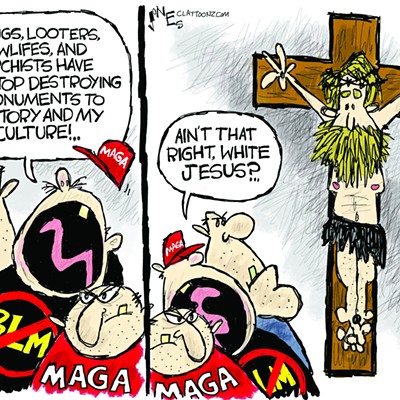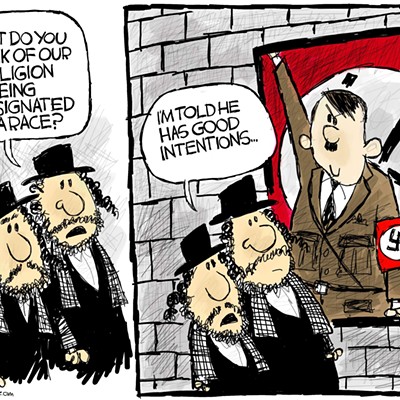But that church remains a dream. In reality, Bagley is among a legion of Catholics torn between their desire for communion and their disgust with a reactionary institution. As local chapter president with the national Catholic group Call to Action, she's furious over this deadlock.
"It may be a church of the people," she says, "but the people don't have any control. People believe if they are the church, then they should have some say." But church leaders "don't want to let them do that, because then they'll lose some control."
Those control issues hit a fever pitch recently, when Call to Action invited Detroit's controversial Bishop Thomas Gumbleton to speak in Arizona. A nationally prominent reformer, Gumbleton was expected to discuss making the church less hostile to homosexuals. But when Tucson Bishop Gerald Kicanas refused permission for the visit, Gumbleton fans had to satisfy themselves with a taped presentation.
According to Bishop Kicanas, the reason behind this refusal was simple: Gumbleton was invited by Call to Action. "I would say that is a group that holds doctrinal positions contrary to the churches teachings," Kicanas says.
Others call that a red herring. Among them is Dr. Paul Lakeland, a professor of Catholic studies at Connecticut's Fairfield University, and author of the recently published book Catholicism at the Crossroads: How the Laity Can Save the Church.
Lakeland says Gumbleton rankles other bishops simply by agitating for change. In particular, "He's being held at a distance because he put himself in disfavor with other bishops in his region by supporting a move to extend the statute of limitations on sex abuse in his diocese. The bishops ... didn't want that, so he became a bad boy."
About that time, 75-year-old Gumbleton was requesting a waiver from mandatory retirement, says Lakeland. Not surprisingly, that request was flatly denied. Nonetheless, the former auxiliary bishop retains considerable influence because of his activism, including opposition to U.S. meddling in Central America in the 1980s, and calls for greater acceptance of gays and lesbians. He continues to write "The Peace Pulpit," a hugely popular weekly column in the National Catholic Reporter.
Bishop Gumbleton didn't return a call from the Tucson Weekly seeking comment.
Meanwhile, church leaders are only fanning the flames, says Lakeland. "They've been clumsy in forcing Gumbleton out of his parish. They're making him into a martyr. They really wouldn't do that if they had any sense. But very often, they don't."
At the same time, he says, several dynamics are dovetailing in the church. For one, former bishops like Gumbleton are quite adept at exposing church problems. "When bishops retire, they have nothing to lose, and some of them acquire a voice. And they can become a nuisance, like the retired bishop of San Francisco, who wrote a highly critical book on the future of the papacy."
Those critiques further stoke already simmering tensions. "Many Catholics aren't that critical of their local pastors," Lakeland says. "But increasingly, since the sex-abuse scandal broke, they're very critical of the bishops." That's also occurring against a backdrop of shifting demographics: "Over the last 30 years, the average Catholic has come to be a much more well-educated person than previously," he says. "At the same time, the average priest has come to be somewhat less well-educated."
All those factors fuel groups like Call to Action. Boasting an estimated 25,000 members nationwide, with more than 200 Tucson sympathizers, the movement claims roots in the Second Vatican Council. Lasting from 1962 to 1965, the council was seen as heralding broad church reforms.
Some 40 years later, those reforms are under assault, says Bagley. "Before Vatican II, it was, 'Do this, or you won't be saved,' or, 'Do this, or you're going to go to hell.' A lot of people are getting beyond that finally. Vatican II suggested that (Catholics) be responsible for their own actions--let your own conscience be your guide and not just follow like sheep."
Call to Action embraces that spirit of reform and expands it to call for the abolition of mandatory celibacy for priests, allowing women to be ordained and giving church members more power over policy.
For that, they're labeled as radicals. "Bishop Kicanas says he tries to avoid extremes" among liberal and conservative church movements, says Bagley. "He calls us one of the extremes. But it just makes me feel that they don't walk the talk. They preach justice but don't act on it."
Kicanas denies that he considers Call to Action extreme. But he says he can't support the group's demands. "I told them I was very open to dialogue, to listening and hearing. But to give permission, you have to agree to what you're giving permission to. And that's where a line has to be drawn."
But drawing that line may continue to drain church support, says Lakeland, particularly among folks who relish their faith--and are far from radical. "I go all over the country talking to groups like Call to Action, and the people I meet are usually in their 60s and 70s. They're Vatican II Catholics, and they're disappointed in what they see as the church dropping the ball on a number of issues.
"These are not Catholic anarchists or something. They are regular churchgoers who love their churches and have given money to support their churches year after year after year."
Although the Tucson Diocese has recently taken baby steps by providing a forum for lay people, it may be too little, too late, says Lakeland. "There's a generalized feeling of disgruntlement within the Catholic Church, over its top-down method of governance. Right now, lay people have absolutely no voice."
That could be about to change, if church leaders keep fumbling. Bagley points to the blocked Gumbleton visit as a case in point. "Bishop Kicanas shot himself in the foot with that, and it did us some good. We picked up several new members because of it."












